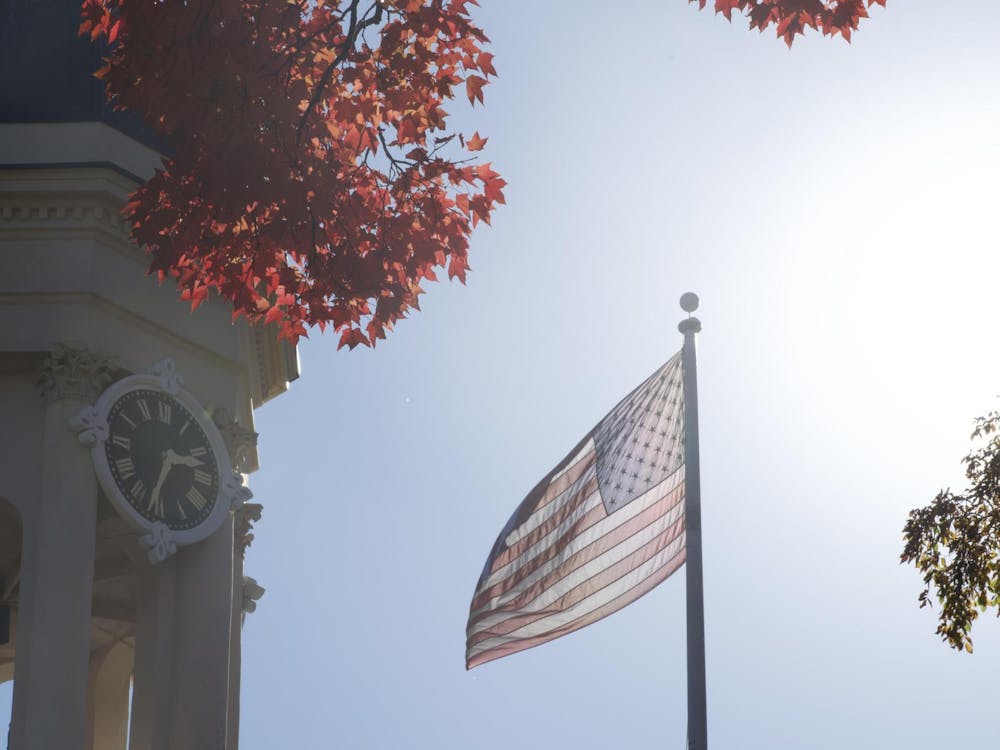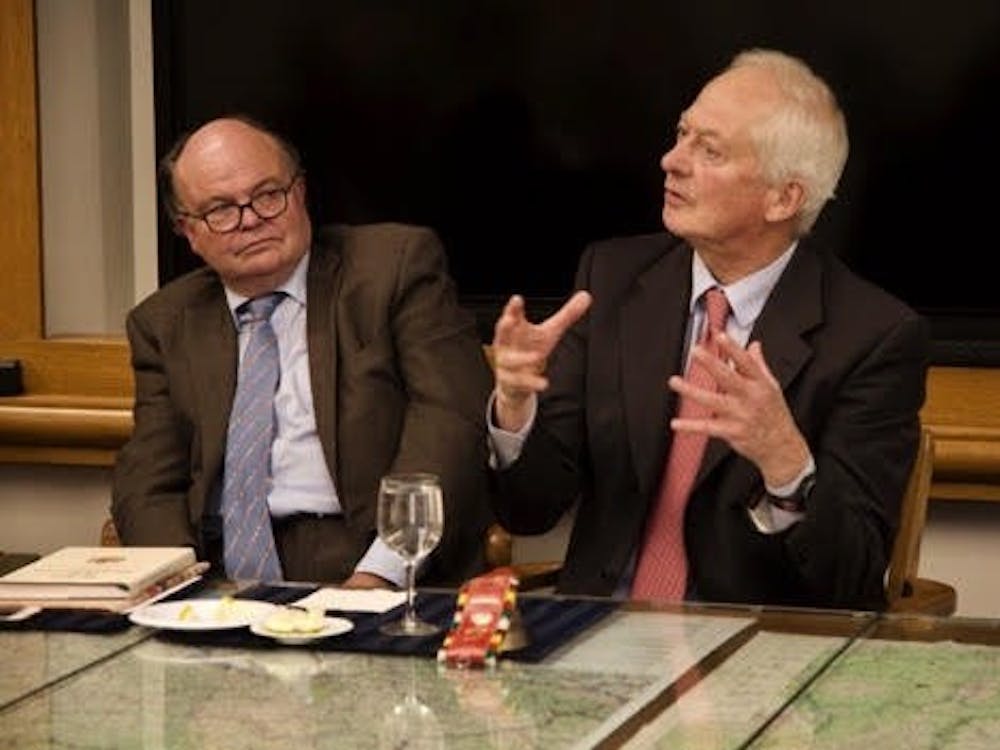Walking down the passageway of a U.S. Navy aircraft carrier somewhere in the Mediterranean, 18-year-old Jimmy Mack realized he was being taught to kill.
Frustrated with the lack of work in Roanoke, Va., he had joined the Navy a year earlier and had already seen the world — Guantanamo Bay, San Juan, Port-au-Prince, Palermo, Naples, Istanbul, Barcelona, Nice.
On his second Mediterranean cruise, however, the novice gunner was struck suddenly by the lethal purpose of his travels. Turning to a message board, he saw a posting that would change his life — the ship's barber needed an assistant.
"I'd never held a pair of clippers in my life," Mack recalls with a chuckle. He feigned experience, though, and got himself transferred from gunner to haircutter. Now, half a world away and half a century later, Mack has his own barber shop on John Street in Princeton, where the one-time military man snips hair and tends a community.
In American lore, barber shops were gathering places for small-town mayors, priests, bankers and cops. The barber played a central role in a community's life. For 38 years, Mack has filled that role for the John Street neighborhood, counseling the teenage boys whose afros and fades he shaped, debating current events with his mostly male clientele, arguing football with everyone.
"Jimmy's the unofficial mayor of Princeton," says Emmanuel Rhodes, Jr., one of Mack's oldest customers.
"John Street," Mack corrects him. "I don't want the whole town."
Mack is short, balding, with chocolate-brown skin and a round face. He is round around the middle, too, in a going-soft-with-age way that adds to his gentle grandfatherly look. His work uniform is a well-worn white zip-up cotton shirt with oversized pockets, which he wears with army green polyester pants and brown hiking boots.

There are no customers in the shop this afternoon — just Mack and his assistant, a 23-year-old West Indies native named Vandyke Grant. Grant has long eyelashes and a large stack of hair piled atop his head, covered in a swath of blue cloth. The contrast with his boss is striking.
Mack takes a seat on a slightly battered metal folding chair. Leaning back, hands behind his head and legs stretched languidly before him, he talks comfortably, launching into an autobiography that starts with his Navy days and ends with the shop's opening "on November the eighteenth, 1962."
It's not the first time he has told the story. He alludes repeatedly to the "other girl" who came recently to interview him — "she was writing a book" — and to the New York University film student who came several years before to document his shop.
He seems not to realize how remarkable this is, that a barber has become such a celebrity. More than once, he suggests interviewing Grant instead.

The neighborhood surrounding Mack's shop was historically a black enclave in a largely homogenous university town. Though the population has recently shifted — many black residents have moved to new housing developments further out of town and an influx of Hispanic families have taken their place — the area remains a thriving working-class neighborhood.
Just a few blocks north of the bustling and posh downtown, weary houses line quiet avenues. Walking from Nassau Street, one can feel the mood ease and the pace slow. Icicle-shaped strings of Christmas lights ring the porch of a gray-shingled house on the left. The neglected grass in a graveyard across the street grows knee-high. On John Street, a handful of old men sit smoking pipes and sharing a porch on the warm autumn day. "Good afternoon," one says in greeting.
Jimmy's Barber Shop sits on the corner of John and Quarry streets. The shop name, painted on the window next to two stickers of barber poles and one actual pole, is starting to wear off. A 1950s-style kitchen chair sits, oddly, on the sidewalk in front of the shop. Inside, two green vinyl barber's chairs stand before a long shelf and a mirrored wall. Above a bare fluorescent light fixture hanging from two strings in the center of the mirror is a price list — $10 Men's regular haircut; $11 fades, women or afros; $9 seniors; $5 shaves.
On the opposite wall stand the waiting area chairs, also green, flanked by a space-heater and magazine table on one side and an ancient refrigerator on the other. Tucked in the corner by the window is a chrome-and-leather barber's chair, a sort of classic car on display.
Among the other classics in the room are a dial television, a cash register just one step up from lever-driven and a black dial-less telephone. Electric extension cords and cable lines wander across the walls in a complex web of fire hazard, and the ceiling buckles ominously.
After he left the Navy — two years' worth of barbering under his belt and both a barber's certification and an honorable discharge in his hand — Mack struck out for San Diego.
"I was gonna go to school there, gonna take up three trades — plumbing, electrician, welding," he recalls. He stopped off in Princeton to visit an uncle who owned a barber shop on Witherspoon Street, and the uncle asked him to stay for a few weeks to help in the shop. "After staying a month," Mack says matter-of-factly, "I been here 30 years."
That's fine with him, though. "I have no regrets," he says. "I like this town."
His shop, which he opened after working for his uncle for several years, has done well. "Business is good," Mack says, pronouncing it bidness. "Business has been good ever since I opened up." Only one customer wanders in during this conversation — Grant takes care of him and Mack barely notices — but that is normal on a Thursday. Friday and Saturday are his busy days.
Though Princeton has boasted as many as four black barbers over the years, Mack is the only one left, and he is reluctant to leave. He hopes to retire at the end of the year, but wants to find someone to take over the shop — so his customers don't lose the convenience of an in-town barber and so Mack can still cut hair a few days per week.
His customers, too, wish he would not leave. "The day he closes the door here," jokes Rhodes, who has been coming to Mack's for decades, "we'll all be standing out on the street singing," — referring to the Martha and the Vandellas hit song — "Jimmy Mack, when are you coming back?"
In part, Mack's customers simply dread the trek to Trenton or New Brunswick for a haircut if Mack's shop were to close. But the regulars will lose more than convenience. Mack has been cutting Grant's hair since 1983, and was "like a second dad to me," Grant says. "He's been schooling me since I been a child."
"I tried to be a role model for younger kids," Mack acknowledges, explaining that he often encouraged boys to learn a trade. His own children, Joyce and James, Jr., both went on to college — she to study computer science and he, communications. And at least some of the neighborhood kids likewise benefited from Mack's fathering skills.
"I told him to go to barbering school," Mack says of his young assistant. "Maybe one day he'll have this place."
Mack's impact on the community goes beyond barber-chair advice. He does house calls for customers too sick to make it to the shop. He visits nursing homes to cut hair. He takes his elderly neighbor grocery shopping. He even, Grant recalls, came to find Grant when he was out of work last winter and living in his mother's house and said "it was time to start working again."
Explaining his generosity, Mack says, "I was fortunate enough to have good health. Maybe someday somebody'll do the same thing for me." No wonder, though, his customers hate to see him go.
"He doesn't remember this," Rhodes confides, "but I got a deal with him that when he retires. He'll put a chair on his back porch, and I'll come by when he's not too busy cutting grass or something and he'll cut my hair." Mack has been cutting Rhodes' hair since his shop opened, when Rhodes was only eight years old. "Don't put that in your article," Rhodes says. "We don't want too many people to know about it."
On a Friday morning, the shop is bustling. Both Grant and Mack are at work on customers while four other patrons wait. When Mack finishes with one customer, another rises without a word to take the chair. It seems there are no appointments, and no one requests either Mack or Grant.
Mack pulls a paper strip from some hidden well behind him and wraps it deftly around the new man's neck. A white and blue striped sheet follows, with a paper towel tucked carefully in the top. All this is second nature, as easy for him as breathing or walking. His movements are measured and smooth, as though he is absent-mindedly stroking a cat.
Grant murmurs briefly with the man about his hair, responding with a litany of "yeah," "OK," "alright" and "hmm-mmm."
Except for hair-related remarks — "they got shampoo for dry scalp" — Mack works in silence, as does Grant, with the soft buzz of clippers and the drone of Headline News as backdrop. Mack leans close and peers under his glasses at his work. At one point, he whistles gently. Nearly finished, he pauses to adjust his pants, then shows the man his new 'do.
"What's going on with Tampa Bay, Jimmy?" asks Rhodes, waiting his turn.
"I don't know," Mack answers, pulling back a customer's ear to trim neatly around it. "I got a hard enough time keeping up with my own team." Dallas Cowboys paraphernalia dominates the shop's decor: a plastic trash can on the barbers' shelf, a 1992 pennant on the wall in the corner, a license plate hung on the mirror next to pictures of Mack's grandson. The only time Mack argues with customers, he says, is when they deride his team. "They start talking 'bout my Cowboys, we got to have a friendly competition."
Football is not on the agenda this Friday, however. Instead, Mack, Rhodes and another customer — a handsome and well-dressed Princeton Theological Seminary student — chat about the controversial trial of two police officers, the market's "bounce back," and the recent ship bombing in Yemen.
"You never know when you're in the service," says Mack, who has reason to know. "Anything could happen."







